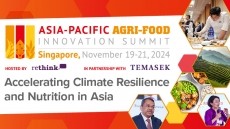‘Not a single cent more’: F&B firms will not need to pay more to join Australia’s national food traceability project

The programme was developed by the Deakin University Centre for Supply Chain and Logistics (CSCL) Food Traceability Research Lab, and is based on GSI data standards which are a common language used along supply chains to identify, capture and share supply chain data.
“We chose to develop this traceability programme with GS1 as the standards provider to make sure we would have international reach, as many major food and beverage companies are already using GS1 standards within their supply chains,” Deakin University CSCL Research Fellow Rose Elphick-Darling told FoodNavigator-Asia.
“I would say most significant manufacturers do use these – we did work with Nestle on this, and I do know that Lion Brewery also uses GS1. It really is familiar to many food and beverage companies, and also to retailers such as Walmart and Coles which use GS1 serialised shipping codes (SSCCs) for their transportation management systems and supplier Advance Shipping Notices (ASN).
“It also has great significance when it comes to exports. Traceability at the supply chain level is not yet mandated in Australia, however it is in a number of destination markets for Australian foods, and many customs agencies worldwide also want to check SSCCs, not just container numbers, and GS1 is a common language used here.
“We anticipate international buyers will find it easier to access the data related to the product’s supply chain and to integrate their own systems to track the product through to the retail outlet and consumer via this programme.”
Globally, many other well-known names such as Mondelez, Target, Carrefour, AEON, Alibaba, eBay and Amazon also employ GS1 standards in their operations.
Elphick-Darling also told us that the team is preparing a Generic Guide for all companies, inside Australia and out, who participate in the programme, and the relevant GS1 standards will be made available online for free within the guide.
“F&B companies who are not currently using GS1 standards need not worry – the guide will lead you the required standards which you can then apply to format the necessary data to be consistent with GS1, things like time and date stamps, such that information can flow properly,” she said.
“These are all free, companies will not need to pay a single cent more to GS1, just go to locate the standards for your country online, get these and pass them to your solution provider or IT manager, and you will be done.
“The only situation in which companies would need to pay would be if you wanted to buy a unique identifier from GS1, for example a unique barcode – but if just formatting your own information within your current supply chain tech, whether it be blockchain or Enterprise Resource Planning (ERP) or anything else, then no, no need to pay anything."
GS1 stressed that its standards are openly available and royalty free for all companies, whether they are members of this programme or any other GS1 organisation or not.
“Any organisation who wishes to access and implement these standards today is welcome to do so, and they are freely available,” said GS1.
More specific guides
Elphick-Darling’s team is also developing module-focused guides covering: On-farm production, Sourcing and procurement, Freight transport and storage, Distribution and food service, Food processing and manufacturing, Retail, Import, Export, and Consumer information.
“The modular approach to the Guides enables supply chain partners to tackle specific visibility issues and to pace implementation with business imperatives. This is very important in the context of disruption being experienced due to COVID-19,” she said.
Further down the line will also be product-specific guides, starting with one on red meat and Elphick-Darling is looking to work with other industries to develop these for other specific product-focused supply chains too, e.g. vegetables, fruits, dairy and so on.
“We hope that industries seeking a guide adapted for their product [incorporating] industry codes and specific characteristics (e.g. temperature and humidity tracking) or value stream guides e.g. sustainable supply chain traceability [will get in touch with us to develop these],” she said.
Local potential
The traceability programme is also hoped to help the Australian food industry better respond to product recalls and allow product origin data to be more quickly authenticated where necessary.
According to Elphick-Darling, for products recalls this can be done by enabling faster identification of all the parties to have handled the product, thus more quickly isolating the problem that caused the recall.
“For example, supply chain partners will know quickly where a variation of temperature or item substitution has occurred, saving time and unnecessary widespread recall beyond the specific batch or lot number,” she said.
“Food safety agencies would be able to access whole-of-supply-chain visibility of distribution channels, and so avoid shelf clearance [and significant financial loss] to companies too.”
As for authenticity, she highlighted that brands are suffering ‘significant financial losses’ as a result of counterfeits, and although biological/isotopic markers in the food products remain the best way to establish provenance, having this traceability system could still help.
“There are means to protect, share and authenticate product origin data in supply chains using unique identifiers that can be verified by the customer [or whoever is checking],” she said.


















